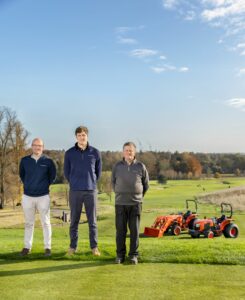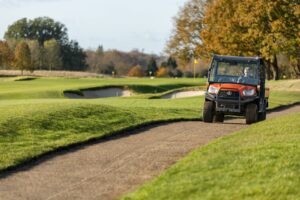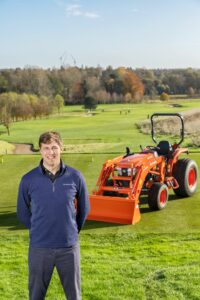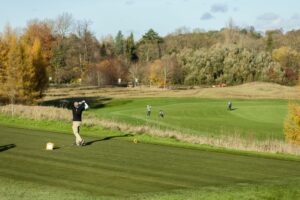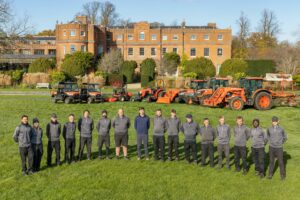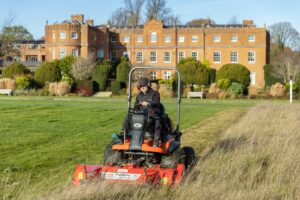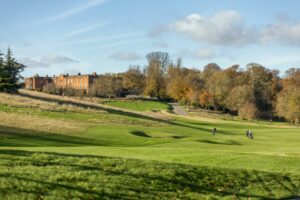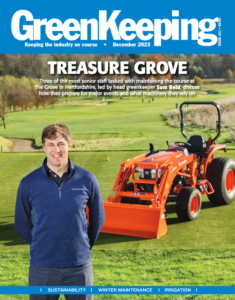Meet the greenkeepers: The Grove
Related Articles
The Grove is widely regarded as one of the world’s best golf courses built this century. Here, we speak with three of the most senior staff tasked with maintaining the course at the resort to find out how they deal with more than three times as much winter footfall than they got just a few years ago, how they prepare for major events and what machinery they rely on.
With multiple ‘Top 100’ rankings, The Grove in Hertfordshire is widely recognised as one of the country’s leading golf resorts – hosts to numerous high-profile events and open to the public with a non-membership policy. Head Greenkeeper Sam Reid, together with William Evans, Golf Course & Estates Manager, and Head Mechanic Neil Corley took time out of their schedules to discuss the dedication demanded to deliver the championship course conditions.
Firstly William, welcome back! We understand your role as Golf Course & Estates Manager is not the first position you’ve held here at The Grove?
William: Thank you! I was at The Grove for three years between 2008 and 2011 as Head Greenkeeper under the guidance of Phil Chiverton. I thoroughly enjoyed my time here and developed greatly. I then moved into golf management with Troon which saw me working in Egypt as a Director of Agronomy and I’ve recently spent time in Bahrain. I’m excited to be back at The Grove, building on the legacy that’s been created here over the last 20 years and working with such a strong and dedicated team lead by Sam and Neil.
How does this experience benefit the course and team dynamic? How many people are currently looking after the maintenance?
William: My past experience helps a lot – simple things like I know where holes 1 and 18 are! Having done Sam’s job, I know the expectations and level of maintenance required and know how to support him and enable him to be more successful in his role. I witnessed how Phil mentored the team, and now use this to move the group to the next phase of its legacy and keep moving things forward. Throughout Europe, standards and investment in golf has increased significantly in the last decade and it is our target to emulate that here, to set the standard for resort-type golf facilities.
We currently have a team of 13 gardeners and 19 greenkeepers, swelling to 21 or 22 in the summer. We have a balanced team with various levels of experience from apprentices through to Neil, our Head Mechanic who has been with us for 19 years.
You are proudly big supporters of apprentices across all areas of operations at The Grove. How important is this to the future stewardship of the course?
Sam: We are immensely proud of our apprentices. Since 2020, five of the team have successfully completed the level 2 apprenticeship, with two of these now holding senior greenkeeper positions.
We have a further five that are either near completion or at the start of their Grove journey. We prioritise succession plans and growth opportunities to ensure The Grove legacy continues. An apprentice starting at The Grove has a clear six-year pathway to produce a competent senior / deputy. This clear career path has seen many of the team progress, including myself starting as a casual worker and moving through the ranks to Head Greenkeeper.
The course looks immaculate! What would you say are the biggest opportunities or the biggest challenges in maintaining this at the moment?
Sam: Post-Covid we’ve seen a golf boom and are probably in a better position than most to take advantage of this with our non-membership policy. Where we may have expected 20 golfers a day in winter, we’re now pushing 60-plus so maintaining the quality that players expect is a challenge. Maintenance windows in the summer have become slim, and when we renovate, we have to allow for a discount / gratuity period so this must be completed quickly which makes the ongoing monthly and annual schedule more intense.
Since William has been back, we’ve seen great success in readjusting our agronomy plans to review products and how we source them. We’ve also been very fortunate with recruitment, welcoming some international experience into the team. We currently have two people from South Africa and one from Kenya which brings new experience and ideas, as well as different working hours. With them living on site, they can utilise hours when the course is empty to conduct various maintenance tasks.
The Grove has a rich history for high profile events, and you remain the only UK venue to have staged a World Golf Championship event, won by Tiger Woods in 2006. This year, you hosted the Rose Ladies Series finale. How did the preparations for this go?
Sam: It’s always an honour to have your golf course chosen for the big events; the build up to The British Masters was amazing to be a part of. It gave us the chance to make the course play a lot harder through raising rough heights, narrowing fairways and really pushing green speeds. Having 60 volunteers on the tournament week also allowed us to push the boundaries of our maintenance practices. The Rose Ladies event in April was challenging because of how slow the spring was to get going!
William: The size of the team was what helped us be ready for the Rose Ladies. Our ethos is ‘to always be a day away from Championship play’. This means we maintain to a high level every day, and with the right tweaks, we are able to offer that extra five percent.
The team have a championship quality mindset and, with some of them working on events at other courses, realise how much we deliver this on a day-to-day basis.
When not hosting tournaments, the championship course is ‘pay and play’. How do you find the non-membership model works for you, and how does it fit into the wider operations across The Grove estate?
William: We strive for our facility to be the most welcoming and deliver a world class experience in golf.
The no membership policy creates a more inclusive and welcoming atmosphere that gives us a niche portion of the golf market. This model gives us greater freedom to offer flexible tee times to our paying guests, to include golf within package opportunities with the hotel or the ability to host corporate golf or a larger tournament – all we need is a decision from the owners.
You’ve recently taken delivery of two new L-Series compact tractors, adding to an already sizeable fleet of Kubota equipment. What was the reason for this purchase?
William: We’ve used Kubota here for many years and have had an outstanding record of reliability and functionality so these two new tractors are replacing aging models like-for-like. The team like the product, they are well suited to our course and give us the adaptability we need to utilise the variety of implements we run weekly and during renovation times. The Kubota equipment is the most used on our fleet.
What role does this fleet of machinery play in the delivery of the outstanding course condition we see?
Sam: I would say it’s invaluable – we wouldn’t be able to do our job function without this equipment. The RTVs are used to transport people, machines and material around the course. They are robust, can work off-road and in all sorts of weather which is perfect for us and important, especially when doing project work.
The tractors are sturdy and not over complex, they’ve found a great balance between productivity and technology, using knowledge and insights from the agricultural market to provide something that is spot-on for a groundcare situation. They’re used day-in, day-out be it with aeration equipment, sand loading, bunker renovations or construction.
What is it about Kubota that keeps you loyal to the brand?
Neil: I’ve been using the Kubota brand personally for the last 30 years and it’s just a quality product. As Sam mentioned, the equipment is not over-complicated meaning everyone, at all levels of experience and background, can get on with it and use it. The gardeners run their own fleet of RTVs for work around the estate – towing trailers and moving mulch – alongside their own tractor.
Servicing is vital in the successful delivery of all greenkeeping operations. What team do you have on the mechanical side?
Neil: I am the mechanical team! It’s always busy, especially with buggies, but with the Kubota equipment it’s really just the regular servicing that I keep on top of. You’ll occasionally get a bit of damage but nine times out of 10 we can rectify any issues and then send the machines back out to do their job. During cutting season, mowers are checked at the end of every day meaning Sam and the team can be assured they’re ready to go again the following day.
Sam: I think the industry is aware there’s a drastic shortage of mechanics and fitters and it cannot be understated how important Neil’s role is within the team.
William: We are actively considering how we can develop the team, perhaps bringing in an apprentice or mechanic to support Neil but, as Sam says, this isn’t always straightforward. Meanwhile, we opt for reliable distributors and suppliers so that Neil always has back-up that way from the brands. The expectation of our guests is to not see maintenance so everything we do is an advance of golf. This means that having an effective and robust machinery fleet is very important to help us achieve that.
How important is the back-up support from dealers when it comes to keeping an equipment fleet running efficiently?
Neil: It’s invaluable and over the years the back-up and support we’ve had from George Browns Limited has been brilliant. They’re always just a phone call away so sometimes you just need a chat with the service manager, or if we need more assistance or an occasional part, someone will always help in a timely manner. We’re looking forward to developing this relationship further over the coming years.
Sustainability is another big focus at The Grove. What are some of the practices you’re currently employing around the course?
William: This is a big focus across the estate, looking at how we can minimise our impact on the environment. Various initiatives are already in place – we have solar panels, water tanks to harvest rainwater and have recycling bins around the course and around the site more broadly. The golf operation specifically is working towards a zero-plastic policy, sourcing products in cartons rather than bottles, and moving away from plastic-coated fertilisers and towards biologically based nutrients.
Sam: We were incredibly proud to receive GEO certification in 2022. In the same year, we also won ‘Environmental Course of the Year’ which was a really big achievement.
We’ve adopted a lot of sustainable practices already but are always thinking and looking for more ways to lessen our footprint on the environment.
What’s the wider vision for the course and what can we expect to see from Golf at The Grove over the next few years?
Sam: We are undertaking a bunker sand exchange project this winter to refresh the sand, drainage lines and the base material. With the course now 20 years old, we will start to also look at secondary drainage needs for some of our wetter lying holes, especially now we experience more intense and condensed rainfall periods. Additionally, the recent visit from our course architect Kyle Phillips has helped us to review mowing lines and has highlighted some exciting projects for the future that would reflect how the game has developed from a length perspective over the years.
William: Irrigation redesign / installation will almost certainly be needed to reflect the changing climate. Water usage is a very hot topic, being effective with our water usage and water consumption is going to be very important going forward. We also have an appetite to host tournaments here so something will happen in the future, though we don’t yet know when or what. In the meantime, we will continue our approach to becoming a leading golf destination in Europe, further improving guest satisfaction and moving ourselves up in the top 100 rankings.

